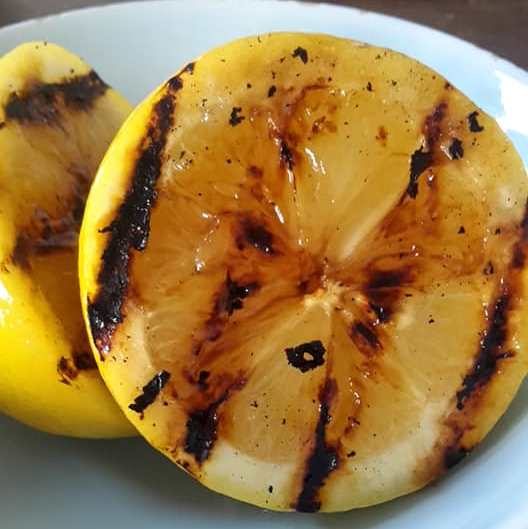There are three things that are inevitable in my life: Death, taxes, and that at some point in my day, I will reach for a lemon. Actually, perhaps four things, as it’s also inevitable that at some point in their blogging life every food blogger must write a post extolling the virtues of the lemon. And here I am, to do just that.

There’s an old saw that goes “If Life gives you lemons, put nine in a bowl.” I’d have a better use for every one of those lemons. Lemons are so absolutely essential to how I cook and how I live in my kitchen. It’s not that I want all my food to taste lemony, but rather that they’re so dang useful. They’re the cornerstone of my cooking. I never don’t have at least one lemon to hand, even if it is a scraggy quartered thing lurking in the nether recesses of my fridge.
In fact, once when taking part in a radio program about matters foodie, I was asked “What food item do you always have in your kitchen?”, and instead of answering something appropriately glamorous like “Pink Himalayan Sea Salt” or “Truffle Infused Honey”, I heard myself say “A dried up quarter of a lemon in my fridge. Inevitably.”
Not the most highfalutin’ response, I suppose, but I can’t tell you how many times that bit of wizened fruit has come to my rescue. Even the most desiccated hunk of lemon will revive entirely when it hits a mug of hot water, honey and scotch, or provide just enough of a sprauncy spritz to liven up some steamed veg, poaching water for fish, or grilled chicken.
Even better, as I recently learned from Samin Nosrat’s masterpiece “Sat Fat Acid Heat”, those last few drops of juice stirred into eggs just before you scramble them will ensure deliciously tender and pillow-y eggs, no matter how dry you cook them. It’s the acid from the lemon hitting the proteins in the eggs and breaking them down. I’ve come to regard acid as the third seasoning.
You have lemons in the house and you have a salad dressing, you have a marinade (or a salad dressing AND a marinade!), you have a flavour base for a roasting tray, you have the cavity stuffer for a roast chicken, you have dessert.
Lemons hit that sweet point of acidity- if you will- that makes them spectacularly versatile. They’re as useful in desserts as they are in savoury foods. The acidity in lemon (unlike me) is never too sharp to compliment. Used one way it can be tart and zingy and another way it’s deeply sour. There’s not an herb, its brightness doesn’t enliven, not a texture as its tang doesn’t suit. And if you char it? You get instant beach-side taverna summer realness, no matter the location or time of year.
Ah, which reminds me – it’s worth mentioning as I’m waxing enthusiastic about lemons that I always buy them unwaxed. The lemon zest (or a whole) lemon is as useful as just the juice, so I don’t want any creepy inedible “wax” in there.
Let’s start with that salad dressing first. Just about any vinaigrette I make is a bit of a misnomer, because I almost never use vinegar. I find that using lemon juice as the acid component in the dressing gives it a rounder, fresher, less fermented acidity. It’s also much easier to pair with wine, as wine and vinegar can really fight on the palate. Also – lemon juice and olive oil are always a perfect match.
Patrick’s Lemon Vinaigrette
The vinaigrette I make most often is very basic, and I always have a jar of it on the go in my fridge. It’s very easy to top up, a bit more lemon juice today, a touch more Dijon mustard or oil tomorrow. I don’t add garlic (because I actually loathe raw garlic in a salad dressing) or onion, because they will turn after a couple of days, and mar the flavour. I use freeze-dried chives instead for a mild allium hit as they last as long as the dressing.

I rarely use fresh herbs in a vinaigrette, because they will wilt under the acid and the oil and lose their impact after a day as well. That said, running this vinaigrette through a blender with a cup of roughly chopped basil makes a fantastic green salad dressing for a large dinner or buffet. Basil is the most ephemeral of herbs, so serve it right away.
What You Need:
- The juice of two lemons
- 1 heaping teaspoon dijon mustard
- 1 heaping teaspoon freeze dried chives
- a big pinch of salt
- a grind of black pepper
- Up to 3/4 cup extra virgin olive oil
Makes approximately 1 cup of dressing (which actually goes much further than you think. A well-dressed salad is one with scant dressing that has been thoroughly tossed)
What You Do:
- In a high-sided bowl, or a plastic jar with a lid, whisk together the lemon juice, mustard, chives, salt and pepper into a smooth emulsion.
- Then add the olive oil until the layer of oil is twice the thickness of the layer of emulsion, making up two thirds of the volume. I can’t give an exact measure because no two lemons give off the same amount of juice. Just eyeball it; it needn’t be exact.
- Then either whisk it all together in the bowl until the oil is fully emulsified too, or put the lid on the jar and shake it until the same result is achieved.
- Taste in case it needs a touch more lemon juice or salt.
It will sit happily in your fridge for a week or two. Depending on how cold you keep your fridge, you may need to take the dressing out about a half hour before you use it, to loosen the chilled oil. Just let it rest for a bit then give it a good shake, and it’ll be right as summer rain!
MOVING ON TO MARINADES
A big squeeze of lemon and a glug of oil and salt and pepper stirred together make a perfect simple marinade to provide tenderizing lubrication for any meat or fish, but in truth all the components – the fat for lubrication and the acid for tenderizing tartness- are all there in that vinaigrette. (Or indeed any vinaigrette). Just shake it up, and pour a bit over whatever protein you’re marinating and leave it to soak in at room temperature for a half hour! And use the vinaigrette to baste it as it grills or roasts!
It’s rare that I roast a chicken without reaching for that lemon. Back in the days before I became a spatchcocking pyscho, I’d quarter a lemon and stuff it in the bird’s cavity along with some salt and pepper and some fresh rosemary and/or thyme. This, along with the chicken’s juices, would get any pan gravy off to a roaringly, flavoursome start.
Nowadays I slice the lemon into thin rounds and line the bottom of the roasting tray with them. Then I scatter over the herbs and seasoning and lay the butterflied bird on top to roast. I get the same effect! And that added mouth-puckering zip from the zest of the lemon means I don’t need any wine to balance the gravy. This also makes an excellent base for roasting lamb or fish.
CHICKEN WITH PISTACHIO AND LEMON SAUCE
Lemon isn’t just about being zingy and breezy and summer-bright; it’s also the perfect partner for anything rich and nutty. I love lemon juice stirred into a sauce at the beginning of cooking, so that its initial tartness becomes a deeper, more mellow sort of sour, one that lifts and rounds a sauce, rather than cutting through it. The following recipe is a perfect example of this.
It’s based on a recipe for Persian Chicken in the original Joy Of Cooking – one of the first recipes I ever attempted as a fledgling cook. Not entirely ersatz, that recipe called for walnuts and pomegranate juice (if available) or lemon juice (if not). I’ve kept coming back to it over the years because I love it so, and then just recently decided to switch the walnuts out for pistachios. There’s something magical about the way the mellow green nuttiness of pistachios melds with the, well, yellow taste of lemon juice. it looks and tastes so gorgeous, and elegantly exotic, that I rather hope I’ve stumbled onto something that already existed.
What You Need:
- 1 onion, finely chopped
- 2 cloves garlic, finely chopped
- 200g/1 cup shelled and skinned pistachios
- 1 1/2 cup chicken/vegetable stock
- juice of 2 large lemons
- 4 skinless chicken breasts
- 1 small handful chopped parsley
- salt and pepper
Serves 4
What You Do:
- Add a good glug of olive oil to a large saucepan that has a lid, and bring up to medium heat.
- Then throw in the onions, salt lightly (it stops them catching), and saute until soft and translucent- about 5-10 minutes.
- Meanwhile throw the pistachios into a food processor and leave it running, occasionally stopping to scrape down the sides. You want the pistachios ground down until they start to cake on you. This will take a good 5 minutes or so in the food processor.
- Once the onions are translucent and the pistachios are ground, add them to the saucepan with the chopped garlic and stir for 2 minutes.
- Pour in the stock and the lemon juice and whisk into the nuts and alliums, You may initially find that the pistachios clump on you in the sauce, but just keep whisking, or use a wooden spoon to press the nusts against the sides of the saucepan, and in a few minutes you’ll see and feel the sauce start to come together and thicken.
- Once it’s thick and bubbly, slide in the chicken breasts, cover the pan, and lower the heat to a slow simmer.
- Poach the chicken breasts for 15-20 minutes in the sauce, taking the lid off for the last 5 minutes.
- The sauce should by now be quite thick and creamy. If not, take the breasts out and keep warm while you raise the heat on the pan and let it reduce for another 5 minutes. Stir in the chopped parsley at the last moment for that final green hit to offset the jade sauce.
- Serve over long grain rice studded with pomegranate seeds, if you like to bump up the exotica.
You can easily make this vegan by using vegetable stock instead and just making the sauce without poaching chicken in it. Serve it over roasted eggplants or chickpea fritters.
Sometimes lemon absolutely is about being zingy and summer bright. Which is what makes it the perfect ingredient for a dessert. Desserts shouldn’t just be sweet; they should also refresh and cleanse your palate after your meal. And what better way to do that than with a lemon mousse, or even better – a lemon posset! A posset is a very traditional English dessert, a set cream that has its origins in a medieval curdled milk drink. If that sounds off-putting, fear not. This is sweet but almost puckeringly sharp and fresh, and so ridiculously easy to make that its utterly dinner party preparation perfection. I’m obsessed. I use this sumptuously simple recipe from UK TV chef James Martin.
LEMON POSSET
What You Need:
- 600ml/21 fl oz double (or heavy) cream
- 150g/5oz caster sugar
- Juice and grated zest of 2 lemons (but keep a third standing by if your lemons aren’t particularly big, or if like me you like this super zesty and sharp)
Serves 6
What You Do:
- Put the cream and sugar into a large pan and put it on a low heat. Slowly bring to the boil, stirring to melt the sugar into the cream.
- Boil the cream for 3 minutes, then remove the pan from the heat and let it cool.
- Then add the lemon juice and zest and whisk it well.
- Spoon into 6 serving glasses and leave to set in the fridge for 3 hours before serving.
Sometimes the brilliance of lemons requires almost nothing other than the lemon itself. I spent part of my childhood in the Mediterranean, and what lingers for me to this day- what takes me right back to a salty Greek summer by the sea – is the smell of barbecued lemon. That tart smokiness, plus a dash of salt, is all any freshly grilled meat or fish needs to be an instant summer lunch sensation. And it’s not just the Greeks who love lemons on protein. The preserved lemons of North African cuisine are a core ingredient and Italians will serve a grilled steak with absolutely nothing on the plate other than a wedge of lemon.
In fact, never underestimate the role of lemons in Italian history. As Matthew Fort notes in his delicious account of eating his way around Sicily, “Sweet Honey, Bitter Lemons”, the modern Mafia was born out of the gangs hired to protect Sicilian lemon groves in the 19th century.
Even on the dullest and darkest of winter days, I can reach back in time to those hot halcyon summers of my youth. All I need is a couple of lemons and a hot griddle, and it’s yassou to the taste of the taverna!
CHARRED LEMONS
What You Need:
- 2 large lemons, cut in half along the equator
- 1 tablespoon olive oil
Serves 4
What You Do:
- Bring a griddle pan up to a medium high heat.
- Once the pan is ready, brush the cut sides of the lemons with the olive oil and place cut side down on the griddle pan.
- After a couple of minutes, give the lemons a quarter turn. You want deep dark cross-hatching marks on the cut lemons and the smell of lemon juice sizzling in the griddle pan.
- Once the lemons have deep char-marks, take them off the griddle and give a half to each diner to squeeze over whatever grilled meat or fish you have served.

I hope I’ve given you a taste of my zest for that citric cutie, the loveable lemon, and some tips on how to zip up your cooking with this most versatile of fruits. Now if life gives you lemons, you can take the tart with the sweet and consider them a gift. At least you won’t get scurvy. (a line about scurvy is inevitable in lemon posts too.)
OBLIGATORY (inevitable) 9 FURTHER USES FOR LEMONS:
You may have encountered some of these genius tips elsewhere, but if so that only demonstrates how they bear repeating.
- If you live in a hard water area, no need to use creepy chemical to descale your electric kettle! Simply fill it half full, squeeze the juice of half a lemon in, and pop the lemon in as well, then boil it a few times. Scale begone!
- As related by the late great Jennifer Patterson, half a cut lemon is the perfect recipient for your fingers to squelch in if you’re trying to get rid of the smell of garlic or fish. Those with torn cuticles or paper cuts may wish to tread with caution.
- Need to brighten up your glassware before a dinner party? Simply rinse in a tub of water into which you’ve squeezed some lemon juice, then leave to air dry.
- If you want to make sure egg whites will rise when making meringue, wipe the sides of the bowl down with a cut lemon first. The acid from the lemon will ensure a clean, fat-free surface.
- Surely we all know by now that any fruit or veg that’s likely to oxidize and go brown once peeled, can be saved from that fate by being placed in a bowl of water with- you guessed it- A SQUEEZE OF LEMON.
- Has your pet brought home a flea infestation? Can you feel those fleas jumping off the carpet and up your feet and legs? Well while you’re waiting for the flea bumb to kick in, simply rub your feet and legs lightly with the cut side of a lemon, and those pesky fleas will leave you alone! Again, those who have recently shaved or waxed may require a pillow to bite.
- Want to keep bugs out of your home altogether? Simply squirt pure lemon juice (or, again, rub the cut side of a lemon) around your windows and doors. Most bugs hate the smell and will stay away.
- Want to quickly disinfect your cutting board? Simply rub it with that lemon!
- After that sun-kissed summer look but not a natural blonde or a fan of expensive treatments? Simply comb pure lemon juice through your hair or apply to the tips and sit out in the sun for half an hour. Lemons will straight up bleach your hair!
